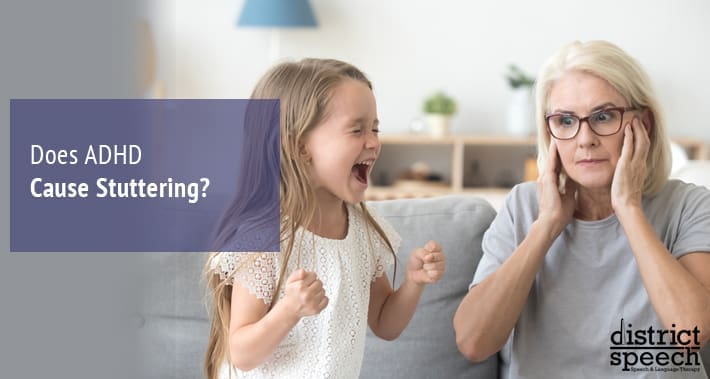
Are you a parent or caregiver of a child with ADHD?
If so, you might’ve noticed your child speaking with frequent unusual breaks or interruptions.
Or they might unintentionally repeat letters, words, or phrases.
Many children stutter during their formative years.
But while stuttering is certainly a common trait amongst children, kids with ADHD are particularly prone to developing this condition.
Left untreated, children with ADHD who stutter during childhood often continue to stutter into adulthood.
RELATED: What Causes Stuttering In Adults And What Can You Do About It?
That’s why early intervention and speech therapy treatments for stuttering are so important.
But more on that in a bit.
Would you like to know more about the connection between ADHD and stuttering, as well as how speech therapy in Washington, DC can help?
We’re District Speech, and we’re here to help on both accounts.
Keep reading to find out more.
What Is ADHD?
Attention deficit hyperactivity disorder (ADHD) affects both children and adults throughout the US and around the world.
According to the Centers for Disease Control and Prevention approximately 6% to 16% of American children are living with an ADHD diagnosis at any given time.
But what exactly is ADHD?
It’s a neurodevelopmental disorder that hinders your attention span, causes hyperactivity, and increases impulsive behavior.
In the past, ADHD was called “attention deficit disorder”, or ADD for short.
These days, however, this term is considered outdated.
Symptoms Of ADHD
Each child is different; people with ADHD experience the disorder uniquely.
Nonetheless, some ADHD symptoms are more typical than others.
Some of the more common symptoms of ADHD include:
- Difficulty focusing
- Difficulty finishing tasks
- Forgetfulness
- Impulsiveness
- Being easily distracted
- Difficulty sitting still
- Frequently interrupting others
- Being hyperactive
- Being hyper talkative
- Frequently daydreaming
- Difficulty reading
What Causes ADHD?
Despite ongoing research, the cause of ADHD currently remains unknown.
Research suggests that neurology and genetics play a significant role, as well as lower levels of dopamine.
According to the American Psychiatric Association, while several genes are linked with ADHD, research has yet to identify a specific gene (or genes) that cause the disorder.
What Is A Stutter?
A stutter is a kind of speech disorder where the flow of communication is interrupted.
RELATED: What Is Stuttering And How Can A Speech Therapist Help?
Someone with a stutter might speak with frequent breaks, repeat parts of words or phrases, or elongate words (prolongation).
Stuttering is also frequently associated with significant mental health challenges, such as poor self esteem or anxiety, particularly around public speaking.
Stuttering is extremely common and affects all types of people; even some famous people.
Signs Of A Stutter
Some of the more common signs of a stutter include:
- Frequent interjections (uhhs, umms, etc)
- Difficulty initiating speech
- Repeating certain sounds
- Elongating certain sounds
- Tension in the face and upper body
- Lip tremors, facial tics, or excessive eye blinking
- Reluctance to speak
- Social anxiety
If you notice any of these symptoms in your child, bring them into District Speech for a speech assessment.
We offer speech therapy for kids who stutter aimed at reducing or eliminating these symptoms.
What Causes Stuttering?
Stuttering may develop due to several different factors, including:
- A family history of stuttering
- Childhood development
- Family dynamics
- Physiology
- Brain injury
Emotional trauma is also positively linked with stuttering; however, this factor appears less common.
Is There A Connection Between ADHD And Stuttering?
Research consistently supports the theory that ADHD and stuttering are linked.
One speech study revealed that 50% of the participants who stuttered also had ADHD.
Though doctors typically diagnose ADHD based on symptoms, it’s also observable in the brain.
The brain of a person with ADHD contains smaller structures in the frontal lobe.
These structures are related to socialization, impulse control, concentration, and emotional regulation.
Apart from these physical indicators in the brain, researchers have observed functional disturbances in the Broca’s area of the frontal lobe in study participants with ADHD.
This might cause speech and articulation issues in people with ADHD.
RELATED: The Parts Of Speech: Articulation
Research also indicates stuttering is sometimes caused by a lack of blood flow to the Broca’s area.
How To Help Your Child With A Stutter Linked With ADHD
Many parents of children with ADHD who also stutter wonder how to properly support them.
ADHD presents unique challenges in your child’s life, but there are ways that you can support and prepare them to face those challenges.
Speech therapy for children can help, but there are things you can do as a parent as well.
Read on for some suggestions.
1. Stay Calm
If your child is struggling with their speech and articulation, staying calm is vital.
Even though you might feel frustrated at times, it’s important to stay positive.
Negative reactions to your child’s behavior or speech will only impede their progress.
It’s normal to feel anger, frustration, and even sadness, but try your best to express them in private, away from your child.

2. Practice Active Listening
Your child may feel a lot at once and not know what to do with the intense emotions.
This can create an overwhelming sense of anger and frustration for them.
Listen to your child, even when they say things in a way you don’t like.
Make sure you let them know that you understand what they’re saying.
You can always explore better ways to express their emotions later.
At the time of emotional distress, active listening helps reduce frustrations with your child’s stutter.
Constantly asking your child to repeat themselves will only make them feel frustrated and embarrassed.
RELATED: Why Do You Always Have To Repeat Yourself In Conversations?
It might take them a long time to say something, but patience is key.
This time will only increase if you get antsy or start doing something else as they speak.
Give them the time they need.
3. Seek Early Intervention Speech Therapy
Early intervention speech therapy will help grow your child’s linguistic competence.
Research shows that treating children with speech or language disorders at a younger age leads to better results.
Early intervention speech therapy for stuttering caused by ADHD can also help boost your child’s confidence when talking.
Book Your Appointment With District Speech Today
ADHD and stuttering both make navigating life significantly more challenging.
At District Speech, we’re committed to helping reduce these challenges.
We are happy to announce that we now offer speech teletherapy sessions to provide you with therapy from the comfort of your own home.
To learn more about therapies and strategies that you can learn with your child, book an appointment with us today.
Our team of trained speech therapists are experienced with working with stuttering caused by ADHD and can meet your child’s needs and help them reach their speech and language goals.
Book with us now and we will match you with one of our qualified speech therapists who will work with you to understand the challenges that your child is facing and put together a plan that suits them.
Book your appointment with District Speech today to find out how we can work for you and your family.
1300 I St NW, Suite 400 E,
Washington, DC 20005
- https://g.page/districtspeech
District Speech and Language Therapy specializes in speech therapy, physical therapy, and occupational therapy solutions, for both children and adults, in the Washington D.C and the Arlington Virginia areas.